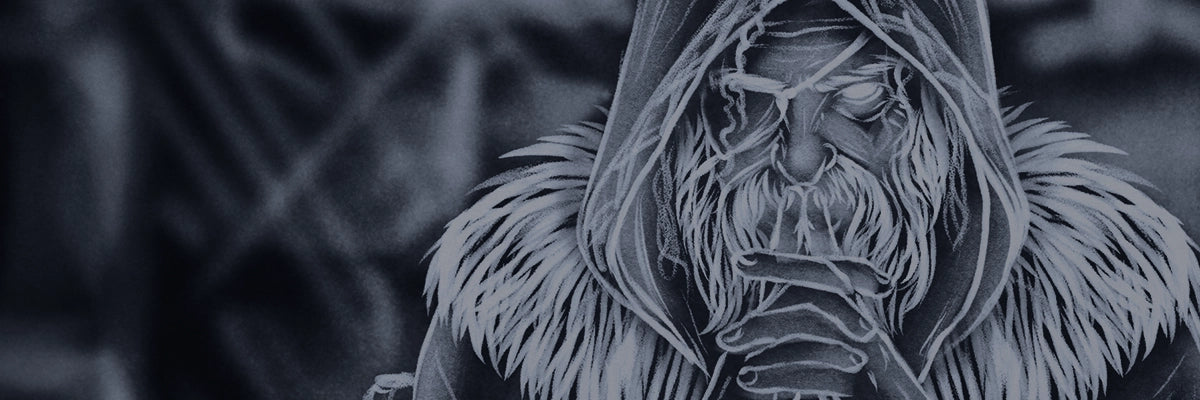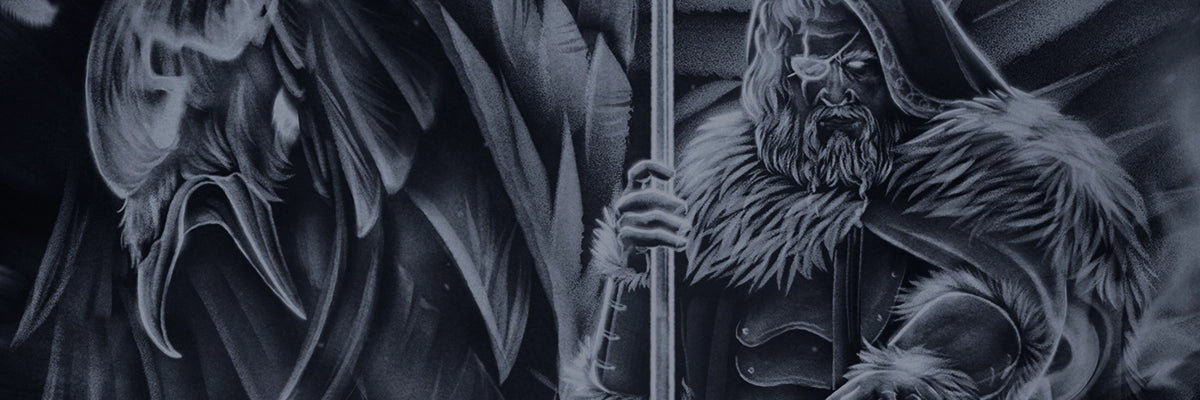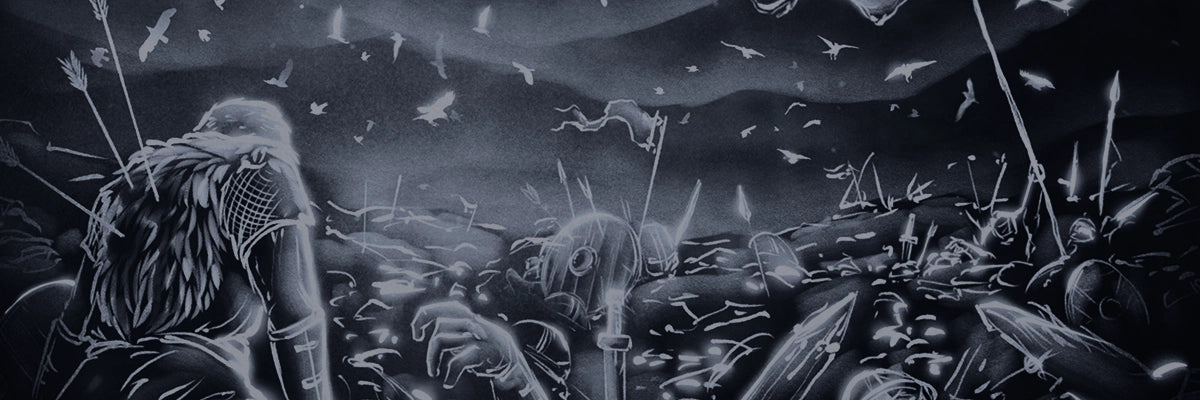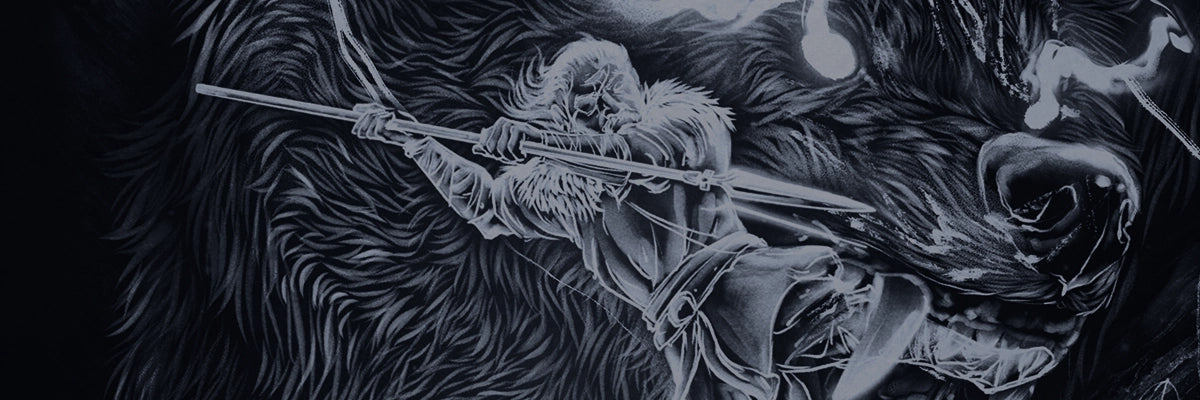
ÓÐINN DEEP DIVE
Who is the Norse God Odin?
In the vast pantheon of Norse mythology, few deities loom as large and enigmatic as Odin. As the chief of the Aesir tribe of gods, Odin commands a unique position among the Norse divine hierarchy. Revered as the god of wisdom, war, poetry, and the runic arts, Odin's influence extends far beyond his role as a celestial ruler.
With his insatiable thirst for knowledge, his never-ending quest for enlightenment, and his willingness to make great sacrifices in the pursuit of wisdom, Odin embodies both the complexities of divinity and the intricate tapestry of human existence in Norse myth.
Óðinn FAQ's
What is Odin the God of in Norse Mythology?
Odin is associated with many concepts in the Norse Myths, though primarily he is associated with War, Death, Poetry, Wisdom and Magic.
He is credited as the author of the Hávamál
Hávamál, often translated as the "Sayings of the High One" or "Words of the High One," is a collection of Old Norse poems found in the Poetic Edda, a compilation of ancient Norse poetry. These verses are attributed to Odin, the chief god in Norse mythology, and they are presented as his wisdom and teachings.
Hávamál consists of 164 stanzas, making it one of the longest and most significant poems in the Poetic Edda. It covers a wide range of topics, including ethics, morality, advice on life, hospitality, runes, and magical knowledge. The verses are structured as Odin's advice to humans on how to navigate the complexities of existence and attain wisdom.
This ancient text provides valuable insights into the moral and ethical values of the Viking Age and offers a window into the worldview and mindset of the Norse people. It continues to be studied and appreciated today for its poetic beauty and the timeless wisdom it imparts.
Huginn, Muninn, Geri & Freki
Huginn and Muninn, often translated as "Thought" and "Memory," are two iconic ravens in Norse mythology, closely associated with the god Odin. These intelligent and mystical birds serve as Odin's constant companions and emissaries, playing significant roles in both conveying information from the mortal realm to the divine and symbolizing the depths of Odin's wisdom and knowledge.
Huginn represents "Thought" and is known for his ability to gather information. He embarks on daily flights across the Nine Realms, observing the world and its events. Through these journeys, Huginn collects valuable knowledge, experiences, and insights, which he imparts to Odin upon his return. As the personification of thought and intellect, Huginn underscores the god's ceaseless quest for wisdom and understanding.
Muninn, on the other hand, embodies "Memory" and is responsible for retaining and recalling the wisdom and information gathered by Huginn. These two ravens together symbolize the cyclical nature of knowledge acquisition, reflection, and retention. Odin's reliance on Huginn and Muninn reflects his role as the Allfather and supreme god of wisdom, as he values the ever-renewing well of knowledge that these ravens provide.
Geri and Freki are two wolves in Norse mythology closely associated with Odin, the chief of the gods. Their names, "Geri" and "Freki," roughly translate to "the greedy one" and "the voracious one," reflecting their insatiable appetite for battle.
These wolves are often depicted as loyal companions of Odin, accompanying him as he sits upon his throne in Valhalla, the hall of slain warriors. According to some interpretations, Odin sustains himself on wine alone, and gives his food Geri and Freki, symbolising the bond between the god and these fierce creatures. Their presence in the mythology underscores the warrior aspect of Odin and the connection between death in battle and the god's domain in the afterlife.
Valhalla & The Valkyries
The Valkyrie are those who choose the dead that are worthy of ascending to Valhalla, and serve as an extension of Odin himself. The word Valkyrie derives from the Old Norse words 'valr' and 'kjósa'. Valr means 'the corpses lying on the battlefield' and Kjósa means 'to choose' which is where they get the name choosers of the slain/dead.
The Valkyries have a much richer history than I'm able to give here, but I'll certainly be making a more in-depth post on those soon enough.

THE GOD OF WISDOM
Odin's Lust for Wisdom
Odin's insatiable thirst for a never ending supply of wisdom is one of the defining characteristics of this enigmatic Norse god.
This relentless pursuit of knowledge reflects not only his intellectual prowess but also his deep commitment to safeguarding the cosmos and guiding his fellow gods through the challenges they face. At the heart of Odin's quest for wisdom is his legendary sacrifice at Mímir's well. According to Norse mythology, Odin journeyed to this mystical well, which held waters imbued with profound knowledge. In exchange for a drink from its waters, Mímir, the guardian of the well, demanded a high price.
Odin willingly offered one of his eyes as payment, symbolizing the lengths to which he would go to gain wisdom. This self-sacrifice demonstrates Odin's unwavering commitment to obtaining knowledge that could help guide the Aesir and protect the Nine Realms from impending threats. Odin's wisdom extends beyond mere knowledge; it encompasses a deep understanding of the runes, the ancient symbols and letters that carry immense power and significance in Norse culture. Odin's mastery of the runes allowed him to decipher their secrets and use them for divination, magic, and communication.

THE SERVANTS OF ÓÐINN
Valhalla, the Valkyries & the Einherjar
The Einherjar, Odin's personal army.
The Einherjar are a private army of decorated and honoured warriors who reside in Valhalla, and a very fascinating aspect of the Norse myths. These chosen heroes are handpicked by Odin and his maidens, the Valkyrie to serve as his elite warriors in preparation for the climactic battle of Ragnarok.
The recruitment process begins on the battlefield, where warriors who die valiantly in combat catch the attention of the Valkyries. These supernatural maidens, often depicted as mounted figures, are tasked with selecting the most courageous and worthy warriors. Guided by Odin's will, the Valkyries choose those who exhibit exceptional bravery, skill, and valor.
Once chosen, these fallen warriors are transported to Valhalla, the majestic hall in Asgard. In Valhalla, they engage in daily training and battle simulations, honing their combat skills and readiness for Ragnarök. They also enjoy a life of feasting and revelry, with endless supplies of mead and the company of their fellow Einherjar.
-

The Valkyries
Servants of Odin who gather the bodies of fallen warriors, transporting them to Valhalla where they will train and feast each day.
-

Valhalla
Odin's grand hall in Asgard, where the Einherjar reside and prepare for Ragnarok; the climatic battle against the the giants.
-

The Einherjar
A massive army who reside in Valhalla. Each day they will fight and feast, relentlessly training for the day thet'll face Fenrir at Ragnarok

FATE IS INEVITABLE
The Death of Odin
The death of Odin is closely tied to the cataclysmic event known as Ragnarǫk, the prophesied end of the world.
According to the Poetic Edda and the Prose Edda, two primary sources of Norse mythological knowledge, Ragnarǫk foretells a cosmic battle of unparalleled magnitude. Odin, the Allfather, plays a pivotal role in this apocalyptic narrative.
As the foreboding twilight of Ragnarök descends upon the cosmos, a host of destructive forces is unleashed.
Fenrir, the monstrous wolf, breaks free of his bindings. The Midgard Serpent, Jormungandr, rises from the depths of the sea. The skies grow dark, the earth trembles, and chaos reigns. Amid this turmoil, Odin faces the direst of choices. He rides forth to confront the apocalyptic horde, armed with his legendary spear, Gungnir, and accompanied by his fellow Aesir deities, but deep within, he knows the inevitable outcome.
During the climactic battle, the monstrous wolf, Fenrir, ultimately prevails, and with a crushing bite, he ends the life of Odin, who will then be avenged by his son Vidarr, who will deliver the killing blow to Fenrir.


